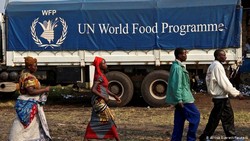The United Nations World Food Programme (WFP) was awarded the Nobel Peace Prize 2020 for its efforts in combating hunger and improving global conditions for peace.
The WFP states that the main causes of food insecurity and hunger are the result of conflict. People living in conflict zones are most affected by this reality and other pressing issues, including destabilization and displacement.
Destabilization is caused when violence erupts within a community, which triggers a ripple effect that impacts the main infrastructure of the community and exacerbates food security for all people affected. Displacement occurs as the result of the destabilization of a community; it is no longer safe, and people have no other choice but to leave. The combination of these two factors causes malnutrition, which affects children the most, according to the WTP.
Therefore, the WFP provides food that helps fortify nutrition, cash/vouchers that make other food sources accessible, school meals that aid children in the classroom, and additional assistance in rebuilding community infrastructures.
Hannah Burke, an MSW student and the intern of the IFSW to the UN, stated, “The World Food Programme is an amazing program – its work is incredibly important for countries that are experiencing food insecurity and famine. I am especially thankful for the work they’ve done for Yemen.” Kerry Lenhart, also an MSW student, added, “The work that the World Food Programme is doing to help countries that are experiencing hardships regarding lack of access to nutritious food and economic crises is crucial and admirable.”
Saliba Sarsar, Ph.D., a Professor of Political Science, commented, “Hunger and the threat of hunger are very real, afflicting millions of people around the world. Food security is a must.” For Sarsar, awarding the WFP the Nobel Peace Prize is a terrific acknowledgement of the essential work of the women and men who are dedicating their lives to assist the hungry, especially in conflict-torn regions of the world. He adds, “WFP’s struggle to stop the use of hunger as an instrument of war is equally important.”
In the Norwegian Nobel Committee’s announcement, they noted the WFP won the prestigious award “for its efforts to combat hunger, for its contribution to bettering conditions for peace in conflict-affected areas and for acting as a driving force in efforts to prevent the use of hunger as a weapon of war and conflict.” The committee also noted that COVID-19 had underscored the importance of this group in supporting the world’s victims of hunger. In the midst of the pandemic, the WFP exhibited a profound ability to reinforce its efforts.
The award aligns with the United Nations’ Sustainable Development Goals (SDGs). Part of the 2030 Agenda for Sustainable Development, the SDGs are a shared model for peace and prosperity for people and the planet, now and in the future. The second SDG represents “Zero Hunger” with the mission to end hunger, achieve food security, and improve nutrition and promote sustainable agriculture around the world by 2030, according to the UN Sustainable Development website.
Monmouth University participates in the mission of the SDGs by implementing its own food pantry and community garden on campus. In turn, we have partnered with Fulfill—Monmouth and Ocean counties’ local Foodbank, to help benefit the local community by providing accessible resources to the surrounding areas.
This United Nations (UN) agency was established in 1961 as a result of U.S. President Dwight D. Eisenhower calling for “a workable scheme” to construct food provision aid through the UN system. It administers food assistance to countries worldwide.
Months after its inception, it responded to a large-scale earthquake in Iran, delivering essential foods to the survivors. Since then, the agency has continued to respond to conflicts and natural disasters throughout the world, including its emergency response to conflict areas such as South Sudan, Yemen, and Afghanistan.
IMAGE TAKEN from DW


